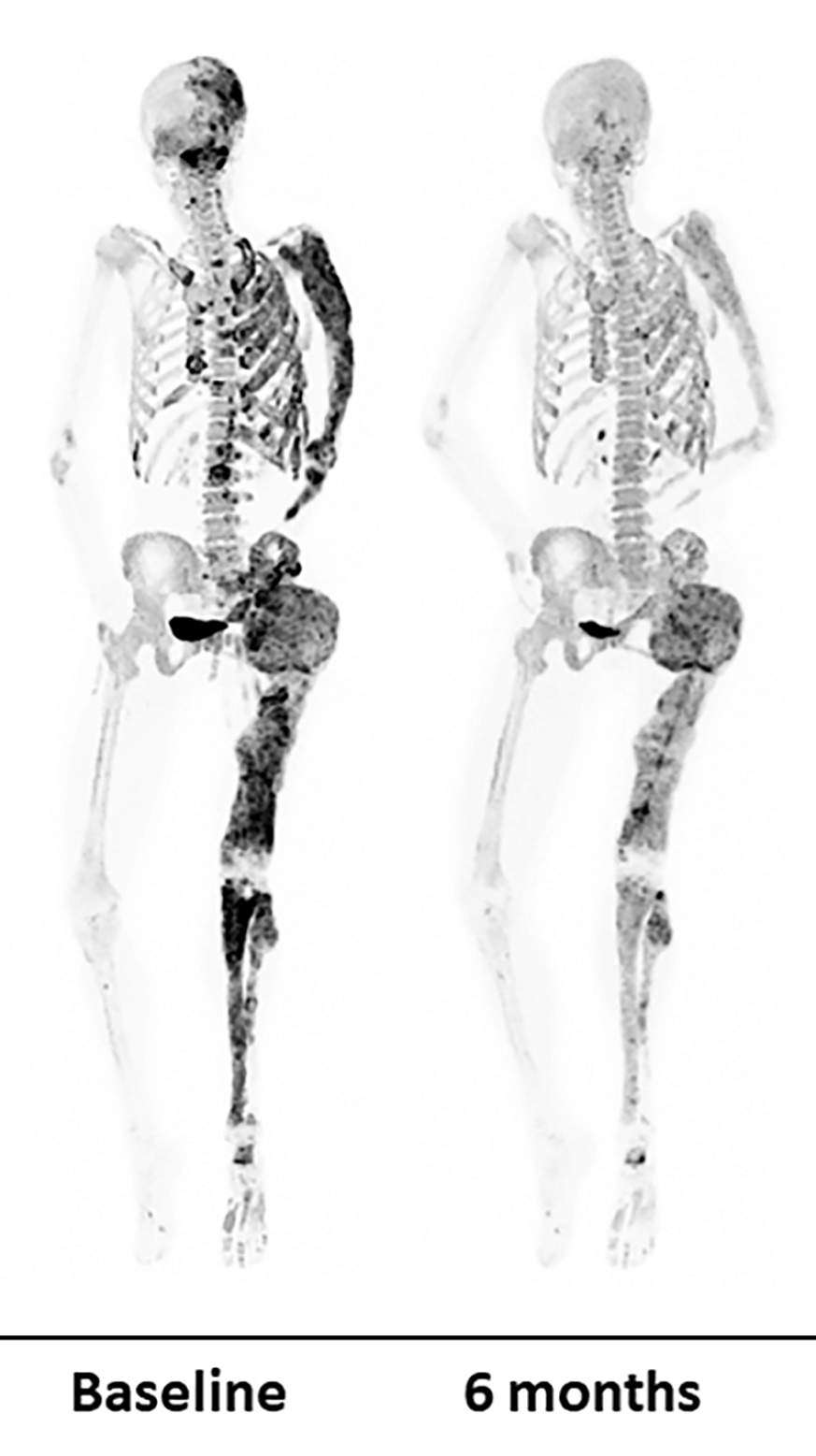You are here
News Release
Tuesday, April 4, 2023
Therapy for Rare Bone Disorder Shows Promise in NIH Clinical Trial
Medication is the first to reduce bone-weakening process in patients with fibrous dysplasia.

A clinical trial at the National Institutes of Health found that a medication, denosumab, significantly reduced abnormal bone turnover in adults with fibrous dysplasia, a rare disease marked by weak and misshapen bones. Bone turnover, a process in which old bone is continuously replaced with new bone, is unusually accelerated in fibrous dysplasia and contributes to bone abnormalities. The study of eight participants was carried out by researchers from the National Institute of Dental and Craniofacial Research (NIDCR) and the NIH Clinical Center. The results, which showed that denosumab may improve patients’ quality of life by enabling healthy bone formation, were published as a correspondence report in the New England Journal of Medicine.
Fibrous dysplasia stems from gene mutations that cause scar-like (fibrous) tissue to replace healthy bone starting in early childhood. These fibrous lesions, which are marked by accelerated bone turnover, weaken bones, leading to bone deformities, fractures, physical disabilities, and pain. In some cases, the lesions can press up against organs and nerves, impairing functions like vision and breathing.
“Surgery is still the standard treatment for fractures and deformities caused by fibrous dysplasia,” said senior author Alison Boyce, M.D., a clinical investigator at NIDCR. “Denosumab is the first medication that appears to affect how fibrous dysplasia lesions behave and improves patients’ disease outcomes.”
Denosumab is a medication licensed by the U.S. Food and Drug Administration to treat bone problems from osteoporosis and cancer. It blocks a protein called RANKL (receptor activator of nuclear factor kappa-Β ligand), which is elevated in patients with fibrous dysplasia and is thought to boost bone turnover.
In the phase 2 clinical trial, eight women received high doses of denosumab over six months. At the end of the treatment period, patients’ bone biopsies and scans showed a marked reduction in bone turnover within lesions. Proteins in the blood associated with bone turnover also dropped to normal levels. These results indicated that the treatment improved the quality and strength of patients’ bones.
Patients also noted reduced complications while taking denosumab. One patient with lesions in the ribs reported increased lung function. Another participant with fibrous dysplasia in the skull experienced vision improvements.
“This trial is the culmination of 25 years of clinical research at NIDCR to understand the underlying mechanisms of fibrous dysplasia and to identify promising treatments,” said NIDCR Director Rena D’Souza, D.D.S., Ph.D.
While denosumab showed promise, abnormal bone turnover returned for all but one of the patients after they stopped taking the medication. In four patients, bone turnover exceeded pre-treatment levels. Dr. Boyce noted that it will be crucial for clinicians to factor in these risks when treating patients.
To determine whether earlier intervention with denosumab can prevent lesions from forming altogether, Dr. Boyce and her team are now testing the medication in a new clinical trial for children with fibrous dysplasia.
This research was supported by the intramural research program of the National Institute of Dental and Craniofacial Research (NIDCR) and the NIH Clinical Center.
About the National Institute of Dental and Craniofacial Research: NIDCR is the nation’s leading funder of research on oral, dental, and craniofacial health.
About the National Institutes of Health (NIH): NIH, the nation's medical research agency, includes 27 Institutes and Centers and is a component of the U.S. Department of Health and Human Services. NIH is the primary federal agency conducting and supporting basic, clinical, and translational medical research, and is investigating the causes, treatments, and cures for both common and rare diseases. For more information about NIH and its programs, visit www.nih.gov.
NIH…Turning Discovery Into Health®
References
de Castro LF, Michel Z, Pan K, Taylor J, Szymczuk V, Paravastu S, Saboury B, Papadakis GZ, Li X, Milligan K, Boyce B, Paul SM, Collins MT, Boyce AM. Safety and Efficacy of Denosumab for Fibrous Dysplasia of Bone. N Engl J Med. 2023 Feb 23;388(8):766-768. DOI: 10.1056/NEJMc2214862
